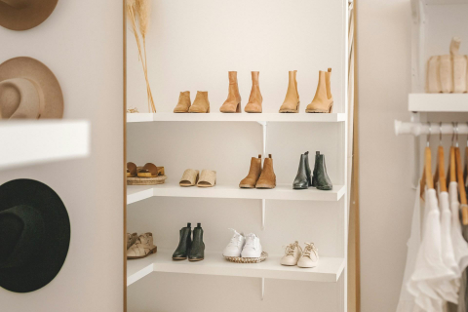
A smart shoe rotation can save both time and feet if you have busy days coming. Too many pairs clutter the wardrobe. Too few put too much wear on one. Finding a middle ground means picking shoes that flex with different outfits, handle long hours, and still feel fresh by Friday.
The right mix avoids overthinking in the morning and underdelivering in the afternoon.
Work routines shape shoe needs more than fashion trends do. A role that moves between meetings, site visits, and standing shifts needs a different base than a desk-only job. So, the starting point always functions first.
Look at how often the shoes will hit pavement or carpet. Footwear that tackles both should offer structure and grip. Flat leather soles might look sharp, but they struggle on rainy walks or uneven surfaces. A small, steady heel or solid tread makes more sense for movement.
Think about what hours look like. A nine-to-five with lots of walking calls for cushioning. Shorter days with more sitting allow for firmer soles and fashion-driven picks.
Some offices lean corporate. Others are more casual. Most live in the middle. Shoes that flow between these zones get worn more. They don’t need to be plain. However, they should walk the line between polished and practical.
A pointed-toe flat holds up under trousers and skirts without skewing too formal. Low-block heels are a steady choice for lifting without wobble. Ankle boots can bridge the gap between seasons without looking heavy in spring or too light in winter.
Shoes that mix leather and matte finishes tend to age better, especially across a weekly rotation. Patent shines, but too much sheen reads occasion-wear. Texture keeps things versatile without being bland.
Three to five well-chosen pairs handle most workweeks. Each one should serve a different need, whether it’s comfort, polish, or personality.
A quick-fit rotation could look like this:
A weekly rotation works best when it aligns with the calendar. Think about what each day demands. Monday might lean formal, and Thursday might be more flexible. Weather shifts through the week, too, so checking the forecast can steer the pick.
If a favourite pair feels like it’s doing too many shifts, that’s a sign the rest need adjusting. Rotation only works when no single shoe carries the full load. Giving each pair time off keeps the whole set looking sharp.
Where and how shoes are kept between wears makes a difference. Cramped storage leads to creases. Leaving shoes out in direct sunlight fades leather. It also weakens glue. Rotating pairs into breathable bags or using shoe trees helps them keep shape.
Wiping shoes down after each wear removes dust and moisture that cause early wear. A quick polish or sole check once a month can also stretch lifespan, especially on pairs that get heavy use.
Womens work shoes need to hold up under pressure and still feel fresh across meetings, commutes, and everyday errands. That’s why smart storage goes hand in hand with smart selection.
Building a small rotation means knowing when to retire a pair and when to replace it. Treads wear down. Insoles flatten. If a shoe starts causing blisters or slips more often, it’s time to cycle it out.
Rotations aren’t fixed. They shift with roles, seasons, and style changes. A new dress code might call for dressier flats. A move to hybrid work might allow more laid-back styles. Updating one pair at a time keeps the system going without a full wardrobe reset.
Done right, a tight shoe rotation handles work weeks with less stress and more comfort. Every pair earns its place. None get worn out too fast. And no more mornings staring at the wardrobe, wondering what works today.